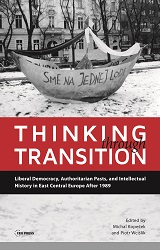

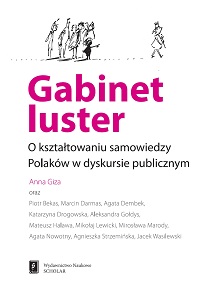
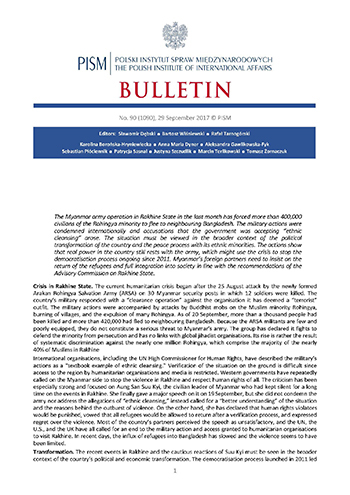
Keywords: religion; Eastern Europe; Europe; Russia; society
The meeting between the Pope and the Patriarch of Moscow and All Russia, which took place on 12 February in Havana, has a special religious and political meaning. Pope Francis and Patriarch Kirill signed a joint statement in which they referred, among other things, to current events in the world, mainly to conflicts in the Middle East and Ukraine, as well as the migration crisis and the persecution of Christians. The points concerning the political situation in Ukraine and hopes for the unification of the factions of the Ukrainian Orthodox Church were considered controversial, and were interpreted as support of the Catholic Church for Russian policy in Ukraine. However, the declaration should be used by the Holy See to facilitate the functioning of the Catholic Church, in Russia as well as in Crimea and Donbas.
More...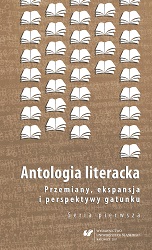
Keywords: anthology; young literary Silesia; regionalism; Marian Kisiel; Paweł Majerski; Dariusz Pawelec
The subject of the article is the phenomenon of the Silesian young poets anthologies published after 1989: Inny świt by Marian Kisiel, W swoją stronę by Paweł Majerski and Martwe punkty by Dariusz Pawelec. The poetry collections in question present a different kind of poetry created in Silesia – different meaning, on the one hand departing from manifesting regionalisms in literary works, dissenting from regarding being‑Silesian only in relation to poetic schemes, while on the other still recording this very quality, subconsciously registering it. The authors of the anthologies have been looking for a common sensitivity amongst the individualities of all writers whose works have been collected. Yet, what the published collections were to show above all, was that there is something happening in Silesian poetry, that it is not stuck in a rut, quite to the contrary: it is changing, moving forward, has its storms and revolutions, and that with each new author comes a new poetics.
More...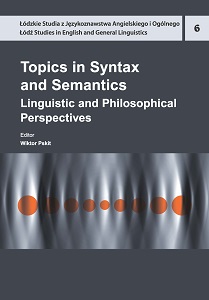
Keywords: modal; epistemic; semantics; must; ordering source
The aim of this paper is to analyse semantics of two Japanese modals of epistemic necessity: hazu and ni chigainai. The analysis shows that although both are of the same type and force, their semantics differs. While hazu seems to be a modal conveying certainty based on credible premises, ni chigainai is connected with premises loosely, and tends to be used as a modal expressing strong belief. Thus I propose to treat the latter as a modal of possibility that takes a shape of necessity on the surface level.
More...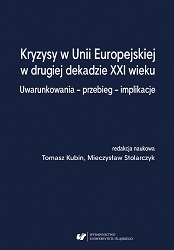
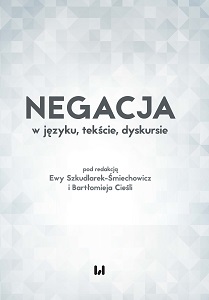
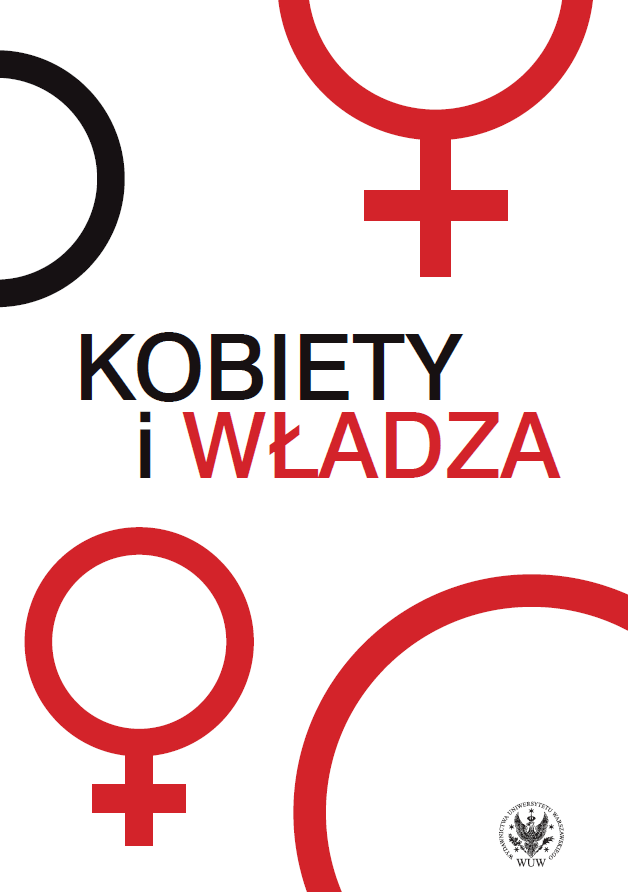
Keywords: Plutarch of Chaeronea; Middle Platonic moralist literatur; Artaxerxes I; Parysati; Stateira
Plutarch’s Life of Artaxerxes II presents the character and the ruling style of the Persianking, focusing on the moral aspect of his attitudes and actions. As an experiencedbiographer, he shows history through people controlled by emotions and experiences.Artaxerxes II for the most part of the work is exposed as a weak ruler, subjected to theinfluence of his mother and of his wife, who fight each other. Based on their struggle,Plutarch creates a war of good, represented by Stateira, versus evil, personified byParysatia.
More...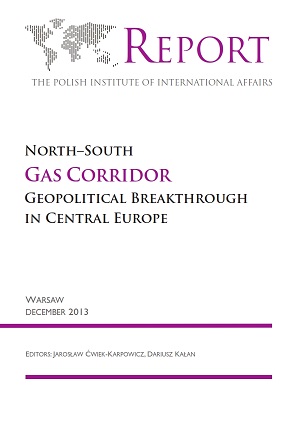
Keywords: European Union; North-South Gas Corridor; Visegrad Group V4; Russian suppliers; energy market; gas supplies; Western Balkans;
The need for the physical integration of EU markets via the North-South Gas Corridor (NSGC or NSI), today constitutes a flagship initiative of the Visegrad Group (V4) and its closest neighbours. The idea to build the gas corridor has arisen from both the geographical proximity of these countries and the similarity of the problems they face, including limited interconnections, poor market liquidity, and the dominance of Russian supplies. It is fair to say that the V4 was able to learn a lesson from the 2009 Russia–Ukraine gas crisis. All of the Visegrad members, which at the time had around 70–80% dependence on both supplies and transport routes from the east, were, to various degrees, hit by the temporary interruption of supplies. This was thus illustrative, not only of how diversification in Central Europe is needed but also of how regional solidarity is necessary to efficiently manage the risk of sudden cuts in the future. It is worth remembering that during the crisis the Czech Republic established reverse flow to Slovakia, while Hungary made emergency supplies from its stockpiles available to the Western Balkans.
More...
Keywords: European Union; importance of gas; North–South Gas Corridor; geopolitics; energy policy; transport of natural gas; EU legislation; energy security; alternative gas suppliers;
The forthcoming years should prove the strategic importance of gas. The gradual replacement of coal as part of the effort to meet the requirements of EU legislation, the growing number of plants producing subsided biogas, and the dramatic changes introduced by the dawning of unconventional gas in North America have created a window of opportunity for natural gas to become a fully-fledged energy resource. The role of gas in Europe will also increase when plans for re-industrialisation—seen by many as a crucial factor to prop up the EU economy—are implemented, since the main sector that consumes gas has been traditionally industry. These are the reasons for why one may predict that in Central Europe in the next 15 to 20 years, the share of natural gas in the overall energy mix will remain rather stable, and may even increase.
More...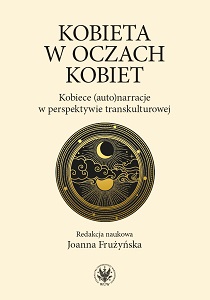
Keywords: journey; existence; memoir; eighteenth century; space
The article attempts to interpret the journey of Salomea Pilsztynowa, described in her memoiras of the eighteenth century. The peregrination of the main character is discussed in the context of sociological and existential aspects of travelling, with consideration of specifications of geo-poetics. The key issue is thus the relation between a location and a person, relation which describes the model of a journey and defines the traveller’s figure. The journey, created in the memoir, combines the features of experimental and existential tourism with wandering about without any plan.
More...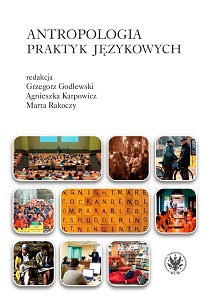
Keywords: language practice; cultural practice; word anthropology; linguistic anthropology
Development and concretisation of the original perspective concerning the word anthropology, which was formed at the Institute of Polish Culture at Warsaw University and used in language practice research. The perspective is considered the best method to perceive the language as cultural phenomenon. An extensive theoretical introduction justifies this approach and puts the undertaken research into the context of contemporary changes in cultural studies. The volume contains twelve articles which present study cases of language practice seen as cultural practice in historical context: from antiquity to modern times, from the forms of word art to swearing and searching the web.
More...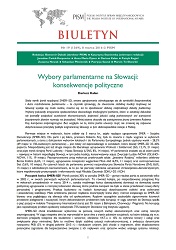
Keywords: Slovakia; parliamentary elections; new government; creating stable coalition; political crisis; foreign policy; immigration policy; anti-immigrant campaign;
Słaby wynik partii rządzącej SMER–SD, awans ugrupowania odwołującego się do symboliki faszystowskiej i duże rozdrobnienie parlamentu – te czynniki sprawiają, że stworzenie stabilnej koalicji rządowej na Słowacji wydaje się mało realne, można się za to spodziewać dalszej radykalizacji debaty publicznej. Wybory pokazały zmęczenie społeczeństwa słowackiego tradycyjnymi partiami, które w ostatniej dekadzie nie potrafiły zaspokoić oczekiwań ekonomicznych, poprawić jakości usług państwowych ani zarysować pozytywnych planów rozwoju na przyszłość. Mniej istotna okazała się zainicjowana przez premiera Roberta Ficę kampania antyimigracyjna. Bez względu na to, która partia utworzy rząd, nie zmienią się zapewne dotychczasowe priorytety polityki zagranicznej Słowacji, w tym dobrosąsiedzkie relacje z Polską.
More...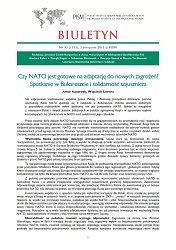
Keywords: NATO; Bucharest meeting; NATO allies; benefits from NATO membership; need for stronger deterrence;
Na zaproszenie wystosowane wspólnie przez Polskę i Rumunię prezydenci dziewięciu państw wschodniej flanki NATO spotkają się 4 listopada w Bukareszcie. Wbrew obawom niektórych z pozostałych sojuszników celem spotkania nie jest podzielenie NATO. Byłoby to niezgodne z interesami Polski i innych państw położonych w pobliżu agresywnej Rosji i w ogromnym stopniu korzystających na członkostwie w NATO oraz solidarności jego członków.
More...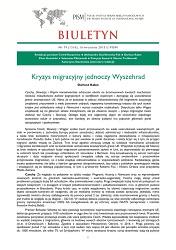
Keywords: Visegrad Group V4; migration crisis; uncontrolled immigration; rejection of an imposed quota mechanism; relocation of refugees;
Czechy, Słowacja i Węgry konsekwentnie odrzucają oparty na przymusowych kwotach mechanizm relokacji mieszkańców państw pogrążonych w konfliktach wojennych i domagają się uszczelnienia granic zewnętrznych UE. Mimo że te postulaty w obliczu niekontrolowanej fali imigrantów zaczynają znajdować zrozumienie u wielu partnerów unijnych, negatywną konsekwencją kryzysu dla tych trzech krajów jest ochłodzenie relacji z Niemcami i wzrost nastrojów radykalnych. Dotychczas tylko Węgry znajdowały się na głównym szlaku tranzytowym, ale po otwarciu nowych – presja migracyjna może dotknąć też Czechy i Słowację. Dlatego będą one najpewniej dążyć do utrzymania wspólnego stanowiska także w przyszłości, tym bardziej że obecna polityka ma poparcie głównych partii opozycyjnych i społeczeństw.
More...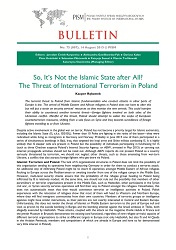
Keywords: terrorist threat to Poland; international terrorism; Islamic State; arrival of Middle Eastern and African refugees; security policy; Ukrainian conflict; counterterrorism measures; monitoring foreign fighters;
The terrorist threat to Poland from Islamic fundamentalists who conduct attacks in other parts of Europe is low. The arrival of Middle Eastern and African refugees in Poland does not have to alter this but will put a strain on security services’ resources as they monitor the new arrivals. This could hamper their ability to counteract another terrorist threat—foreign fighters involved on both sides of the Ukrainian conflict. Mindful of this threat, Poland should attempt to widen the scope of European counterterrorism measures, shifting from a sole focus on Syria and Iraq towards surveillance of foreign fighters travelling to or from Ukraine.
More...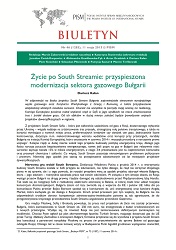
Keywords: Bulgaria; modernization of gas sector; failure of the South Stream pipeline project; building European gas hub; Vertical Corridor with Greece and Romania; routes and sources of gas supply;
W odpowiedzi na fiasko projektu South Stream Bułgaria zapowiedziała stworzenie europejskiego węzła gazowego oraz Korytarza Wertykalnego z Grecją i Rumunią, a także przyspieszenie eksploatacji własnych zasobów surowca. Chociaż nie wszystkie te pomysły mają szansę na realizację, Komisja Europejska powinna nadal wspierać rząd w Sofii w jego wysiłkach na rzecz zróżnicowania tras i źródeł dostaw gazu. Od ich efektów w dużej mierze zależeć będzie powodzenie unijnych projektów dywersyfikacyjnych w regionie.
More...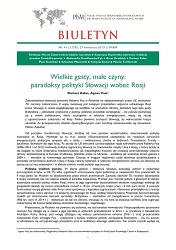
Keywords: Russian Federation; Slovakia; Slovak support to Russia; conflict with eastern Ukraine; Slovak European policy; foreign policy;
Zapowiedziana obecność premiera Roberta Ficy w Moskwie na zbojkotowanych przez UE obchodach 70. rocznicy zakończenia II wojny światowej jest kolejnym przykładem wsparcia udzielonego Rosji przez Słowację w czasie pogłębiającego się konfliktu na wschodzie Ukrainy. Jednakże tego typu gesty Bratysławy – jakkolwiek ryzykowne z punktu widzenia jej polityki europejskiej – nie zawsze pokrywają się z celami politycznymi, które, szczególnie w sektorze energetycznym, wiążą się raczej z ograniczaniem zależności od Rosji. Polska powinna zachęcać Słowację, by wykorzystała kryzys ukraiński do przyspieszenia działań dywersyfikacyjnych oraz bardziej zainteresowała się kierunkiem Północ–Południe.
More...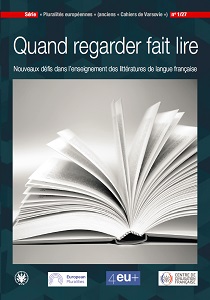
Keywords: online learning; humanities; history of culture; higher education; Sixties; French culture
The aim of this paper is to present the ideas that lay behind the conception of two online courses Artistic and literary life of Paris (19th-20th centuries) and The Sixties: The Beatles and Their Time designed for all the interested students of the University of Warsaw. The paper explains the organization of the course, presents its layout and the teaching methods used.
More...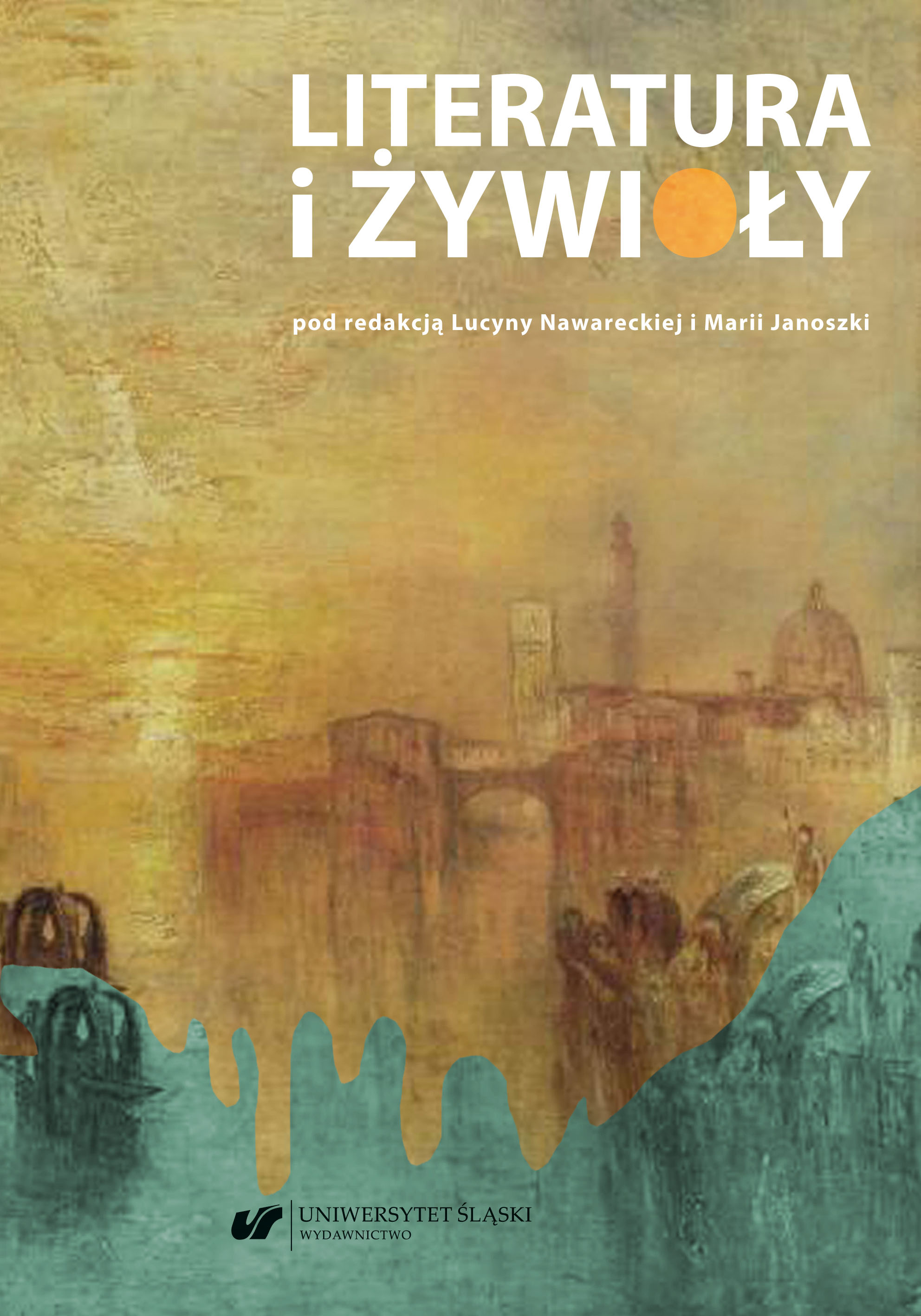
In general, the artictle deals with the problem of the incompatibility of philosophical reflection on natural language with structural linguistics. This issue is treated as a manifestation of a more general process: regardless of the deepening discrepancy between the domain of “science” and the domain of the humanities, social sciences included, there is a growing tendency towards mutual separation between “disciplines” belonging to the broadly understood humanities. More specifically, the study proves that the foundations of de Saussure’s theory can be derived from the semantic distinction present in French, while Wittgenstein’s criticism, as expressed in the Philosophische Untersuchungen and levelled at the systemic approach to language, is conditioned by the lack of an analogous distinction in German.
More...